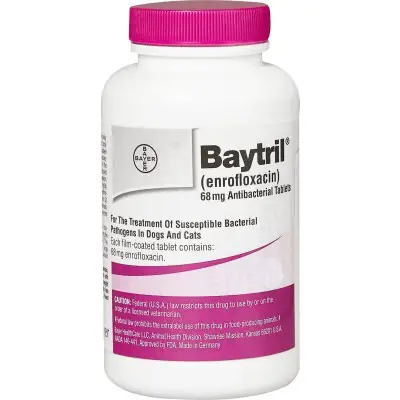When You Should Use Baytril for Dogs
31.08.2021.
Every product and service on World Dog Finder is independently selected by our editors, contributors, and experts. If you purchase something through our links, we may earn a referral fee. Learn more
Like humans, dogs are susceptible to bacterial infections. Like us, they will need antibiotics to get rid of those infections. Some of the bacteria that can infect our dogs are pretty bad. In that case, dogs will need an extra-strong antibiotic. Luckily, veterinary medicine has a few tricks up its sleeve. One of these tricks is an antibiotic called Baytril. If your vet prescribed your dog with Baytril, here’s what you should know about it.
What is Baytril?
Baytril for dogs is a fluoroquinolone antibiotic used to treat specific infections in dogs and other small mammals. This antibiotic is effective against Gram-positive and Gram-negative bacteria. Pseudomonas and Staphylococcus are very resilient bacteria that vets had lots of problems treating. However, Baytril made it a lot easier dealing with these nasty and dangerous bacterial infections. This antibiotic for dogs is most commonly prescribed in cases of skin and ear infections.
IMPORTANT NOTICE: Baytril is a potent antibiotic that can be prescribed by a licensed vet. You should never medicate your dog on your own or use this medication without consulting your vet.
Is it effective?
Baytril has a unique way of dealing with bacteria - it prevents them from transcribing the DNA. The problem with this antibiotic is that it is not that effective against anaerobic infections. In those cases, it is usually prescribed with other antibiotics to boost their function. However, since Baytril is usually prescribed for skin infections, that’s where its effectiveness should be trialed. Luckily, it is very effective against such infections.

Is it safe for dogs?
One of the first questions dog owners often ask their vet is, “Is Baytril safe for my dog?” This is where it becomes tricky. Baytril is a very specific medication, and it should be used only in some conditions. Pregnant or nursing bitches should never take Baytril. It can influence the cartilage, so developing dogs under 1 year of age should not take it. It is also noted that dogs with central nervous system issues should not take Baytril. However, if your vet prescribes it and is aware of these restrictions, Baytril can be safe.
Baytril side effects
Since this is a powerful antibiotic used to treat very resilient bacteria, it might cause adverse reactions. Side effects and antibiotics are usually connected, and Baytril is not an exception. The most common Baytril side effects for dogs are;
- Diarrhea
- Lethargy
- Vomiting
- Loss of appetite
- Cataracts (after long exposure)
- Convulsions
- Seizures (in dogs with central nervous system issues)
IMPORTANT NOTICE: Baytril can interact with many different drugs, so it is absolutely crucial you tell your vet if your dog is taking other medications or supplements. If you fail to do that, chances are your dog might have a bad reaction.
Where to get it?
Baytril is a controlled substance, meaning that only a licensed vet can prescribe it. If you took your dog for a checkup, and your vet decided they need this particular antibiotic, there is usually a very good reason for it. Take the prescription and go to your local pet pharmacy, where you can pick the medication up. There is a convenient way of ordering Baytril online from Chewy. You need to show them the prescription, and you can order it here;
How is it given to dogs?
Baytril comes as a tablet, and dogs take it with a tiny bit of food, especially if they vomit after taking the drug. If they do not vomit, the drug can be given on an empty stomach. It is a fast-acting drug, and it will take effect in 1 or 2 hours. Baytril is given once or twice a day, depending on several factors your vet will calculate in their decision.
Since it is a powerful antibiotic, it is crucial you stick to your vet’s recommendations and guidelines. Don’t try to change your dog’s dosage because you risk overdosing your pet. If that happens, call your vet immediately. If they don’t answer, call Pet Poison Helpline 800-213-6680.
World Dog Finder team









Share